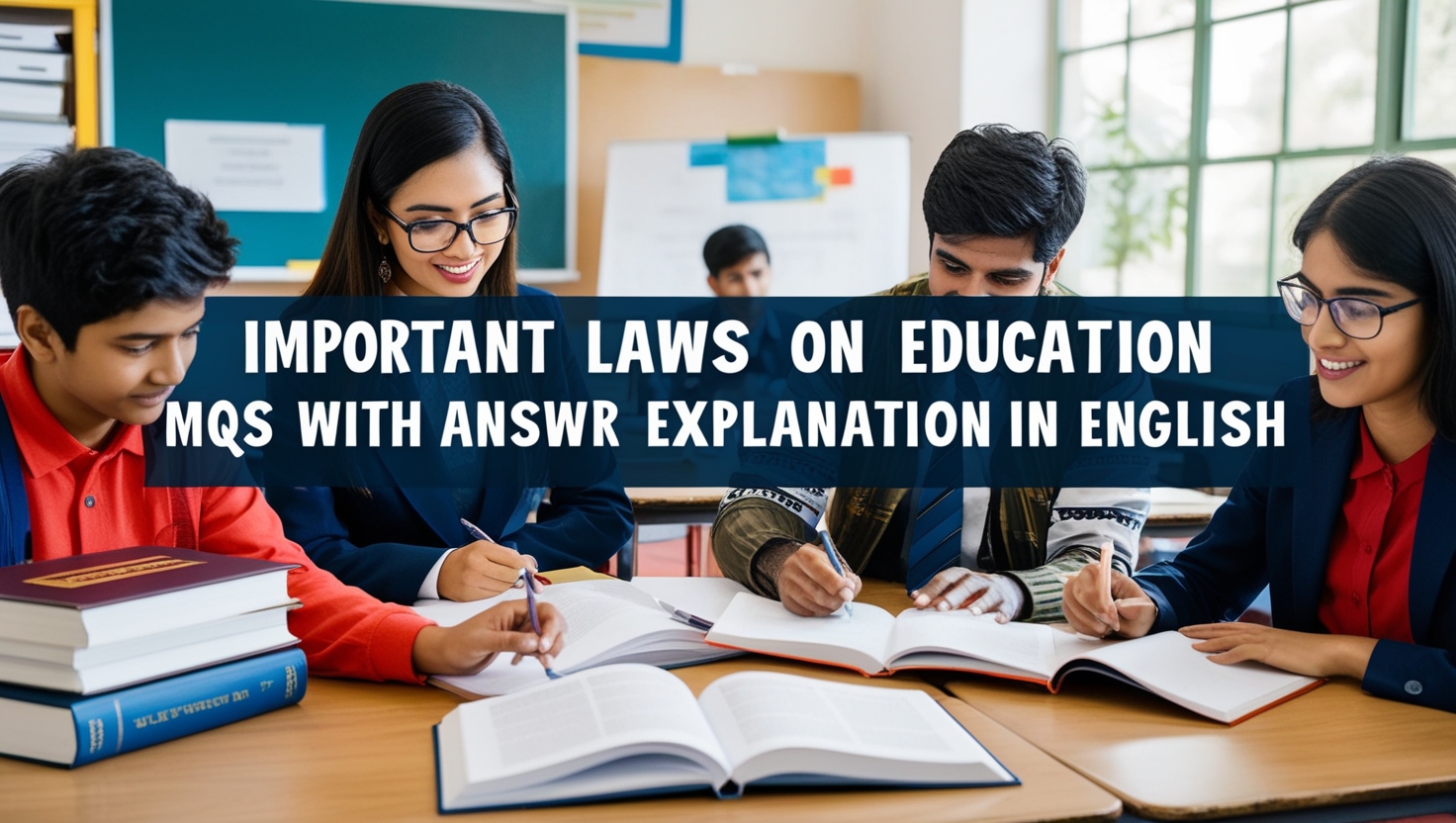
In this article, we explore Important Laws on Education GK MCQs With Answer & Explanation in English, designed to enhance your understanding of key legislative frameworks governing education in India.
These multiple-choice questions cover essential topics such as the Right to Education Act, policies promoting inclusive education, and the regulatory bodies involved. Whether you’re preparing for competitive exams or simply looking to broaden your knowledge, this comprehensive guide will provide valuable insights and explanations to support your learning journey.
1. The Indian Institute of Management Act was enacted in which year?
- 2016
- 2017
- 2018
- 2019
Show Answer
Answer: 2017
This act, passed in 2017, declared Indian Institutes of Management (IIMs) as institutions of national importance. It granted them the authority to confer degrees and make significant changes in their administration. Prior to this, IIMs could only offer diplomas. The act also outlined the composition of the Board of Governors, including provisions for the appointment of eminent personalities from the fields of education and industry.
2. According to the Indian Institute of Management Act, 2017, the board of governors can have a maximum of how many members, including the chairman?
- 19
- 20
- 21
- 22
Show Answer
Answer: 19
The Institutes of Technology Act of 1961 provides legal status to the Indian Institutes of Technology (IITs) in India. It grants them the authority to offer degrees and is a significant piece of legislation related to higher education. The act was enacted to foster technological education and research in India, with IITs being recognized as Institutes of National Importance. It came into effect on April 1, 1962.
3. Indian Institute of Management Act, 2017, provides for the creation of an academic council which takes decisions about which of the following?
1.Academic content
2. Criteria and processes for admissions to courses
3. Guidelines for the conduct of examinations
Choose the right option:
- Only 1
- Only 2 & 3
- Only 1 & 3
- 1, 2 & 3
Show Answer
Answer: 1, 2 & 3
Indian Institute of Management Act, 2017, provides for the creation of an academic council which takes decisions about the following: 1. Academic content 2. Criteria and processes for admissions to courses 3. Guidelines for the conduct of examinations
4. In which year was the Institutes of Technology Act enacted?
- 1960
- 1961
- 1962
- 1963
Show Answer
Answer: 1961
The Institutes of Technology Act of 1961 is a landmark legislation in India. It confers legal status on the Indian Institutes of Technology (IITs), recognizing them as institutions of national importance. This act grants IITs the authority to grant degrees to their students. Before this act, IITs were operating as autonomous institutions but did not have degree-granting powers. The act came into effect on April 1, 1962, and significantly contributed to the development of technical education and research in India.
5. Which act declared Indian Institutes of Technology as Institutes of National Importance?
- The National Institutes of Technology, Science Education and Research Act, 2007
- The Indian Institute of Management Act, 2017
- The Institutes of Technology Act, 1961
- None of the above
Show Answer
Answer: The Indian Institute of Management Act, 2017
The Indian Institute of Management Act of 2017 declared Indian Institutes of Technology as Institutes of National Importance. The Act came into effect on 1 April 1962.
6. The Right of Children to Free and Compulsory Education Act or Right to Education Act (RTE) was enacted in which year?
- 2009
- 2010
- 2011
- 2013
Show Answer
Answer: 2009
The Right of Children to Free and Compulsory Education Act or Right to Education Act (RTE) was enacted on 4 August 2009. It describes the modalities of the importance of free and compulsory education for children aged between 6 to 14 years.
7. Which article in Part III of the Constitution of India is related to free and compulsory education?
- 19
- 20
- 21
- 21A
Show Answer
Answer: 21A
The Fundamental Right to Education is enshrined in Article 21A in Part III of the Constitution of India in accordance with the provisions of the Right to Education Act, 2009.
8. The Right of Children to Free and Compulsory Education Act requires all private schools (except the minority institutions) to reserve how many percentages of seats for the poor and other categories of children?
- 15%
- 20%
- 25%
- 27%
Show Answer
Answer: 25%
The Right of Children to Free and Compulsory Education Act, commonly known as the Right to Education (RTE) Act, was enacted in 2009. This act plays a pivotal role in ensuring free and compulsory education for children aged 6 to 14 years. It makes education a fundamental right, enshrined in Article 21A of Part III of the Indian Constitution. Under the RTE Act, private schools (except minority institutions) are obligated to reserve 25% of their seats for children from disadvantaged backgrounds, thus fostering inclusivity and equitable access to education.
9. The University Grants Commission Act was enacted in which year?
- 1950
- 1952
- 1954
- 1956
Show Answer
Answer: 1956
The University Grants Commission Act of 1956 was enacted by the Indian Parliament. This act established the University Grants Commission (UGC) and outlined its functions and responsibilities. The UGC Act provides the legal framework for the UGC to fulfill its mandate, which includes coordinating and maintaining the standards of higher education in India, disbursing grants to universities and colleges, and promoting and ensuring the maintenance of academic standards. It plays a crucial role in shaping the landscape of higher education in India.
10. Which of the following have been established by legislation?
- Indian Institutes of Technology
- Indian Institutes of Management
- National Institutes of Technology
- All 1, 2, 3
Show Answer
Answer: All 1, 2, 3
All of them have been established under respective legislation.








Leave a Reply